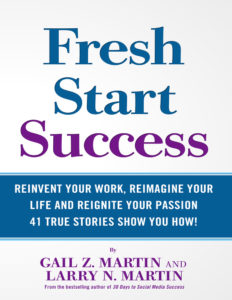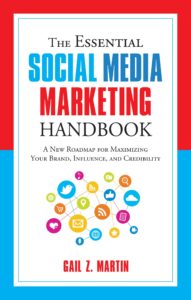 by Gail Z. Martin excerpted from Fresh Start Success: Reimagine Your Work, Reinvent Your Life, Re-Ignite Your Passion
by Gail Z. Martin excerpted from Fresh Start Success: Reimagine Your Work, Reinvent Your Life, Re-Ignite Your Passion
Poonam Gupta-Krishnan went to school to be a chemist. She earned degrees in chemistry and education, and later taught math, physics, and chemistry. She moved into research and was very successful, working for two multinational chemical manufacturing corporations. She liked her work and the corporations gave her experience in both chemistry and manufacturing. Poonam also understood the technology challenges facing manufacturers.
As a research scientist, she handled all aspects from lab research to the production process, which meant that she also knew where the processes faced problems or had room for improvement. She did well in the corporate environment and liked her work, but realized after a while that there were no growth opportunities for women of color. When Poonam moved into Information Technology, she gained a different understanding of problems from the user’s perspective. So Poonam developed software for manufacturing focused on fixing the end-users’ problems.
Poonam was in a well-paying job heading a research group when her daughter was born, but the position required long hours and did not have flexibility. That was difficult now that she had a small child. It also bothered her that she did not see promotion opportunities for herself. “I did not want to kill my spirit by completely leaving the workplace or feel humiliated by staying in a ninety-nine percent male dominated company that did not understand the need for flexibility,” she recalls, thinking about why she left. Getting a Ph.D. might have led to some additional internal opportunities, but Poonam wanted more independence without the pressure to perform to other people’s standards. “I looked for options and considered my skills, talents and experience,” she said. “I thought about what kind of fulfillment I wanted, and what kind of flexibility that I was looking for. I wanted to fix IT processes and help businesses that hadn’t been helped by large IT vendors. I’m very analytical, a good problem solver, and I knew the technology and process challenges of manufacturers. I wanted to help manufacturing companies thrive.”
Poonam became an entrepreneur. She started a company that provided software services to small and medium-sized manufacturers. Over the years, it grew into providing a range of data and information management products and services. However, her true passion had always been travel and writing. Dreaming of becoming a travel writer, she decided to take a leap of faith. Today her company has evolved to become one of the most sophisticated technology services companies in Big Data Analytics. Her firm provides IT consulting and Data Analytics services to the private and public sectors in manufacturing, education, healthcare, and finance.
Poonam built her company facing limited resources, as well as social, financial, and health challenges. She is a first-generation immigrant who came to the U.S. as a student. When she resigned from her last corporate job, she had a two-week pay cushion and started her IT services company with no money. “I didn’t worry about money, even when I didn’t have much, because I knew that if you have quality offerings, the money will come,” Poonam says.
It took two years to build her company and Poonam put everything into the business with no financial support or equity. “Having no money and making no money even after long hours of work was not fun,” she recalls. But she kept at it, honing her skills, getting out to network, and learning to be ‘a little bit shameless’ about promotion and asking for what she needed. She went back to her last employer and talked to the head of the MIS department, since she had parted ways on good terms. “I found that the fear is less when you focus on the job,” Poonam says of venturing beyond her comfort zone. “Frustrations are often deep and long, but if you do something enough times and you appreciate what you bring to the table, you will succeed.” Poonam found that her self-confidence and her belief in the value of what she had to offer grew as she got out and talked to people. “Stay with it, have faith, keep expenses low, and be humble,” she advises.
For Poonam, the social part of growing a business was more difficult than the technical aspects. She was very aware that she was different, as a woman and an immigrant and a person of color, that sometimes presented a hurdle. “People subconsciously like people who are like themselves,” she says. “That can be difficult when you’re an intelligent woman trying to get into a male-dominated industry, and I was often the only woman present in Chemistry and IT circles. Men were used to a boy’s club. I looked different and was a woman, and I had family responsibilities, where men were free to just hang out in the bar and talk,” she recalls.
Poonam networked with professional women in a variety of organizations and found them to be kind and supportive. She learned to accept their help, mentorship, and guidance. That led to an important discovery. “If you have something of value, the differences don’t matter,” Poonam realized. To get the word out, she gave free speeches on technology, innovation, and best practices, which also helped people get to know her and helped her become more comfortable with networking. As she demonstrated her experience and showed what she knew, people asked to learn more.
In Poonam’s journey, she found opportunities to improve IT innovation in the government sector. “There’s a disconnect,” she explains, “because they lack a collaborative platform that brings private sector, public sector, entrepreneurs, small businesses, universities, and special interest groups together.” Poonam founded a not-for-profit organization, Government Technology Foundation, Inc. (GTF) to address that need. “The reason entrepreneurs take the route of ‘path least travelled’ is so they can fulfill their heart’s desire,” Poonam says.
Along the way, Poonam faced health challenges with no extended family nearby. A serious infection caused problems that meant she couldn’t drive for over a year, and she was faced with large medical bills. During that time she had to delegate, and her employees at that point were not as skilled as she was. They made some bad financial decisions, which undid more than three years of what had been built. Business owners should learn how to manage their cash flow to Prevent Company Debt and eventually boost their profits. If you need help managing your business financial liabilities, you may consider consulting a business insolvency expert.
When Poonam returned to work, she knew she needed to turn things around, so she decided to lower prices and pick up small jobs to build cash. That got the business back on its feet and she kept improving processes. As her children got older, she could put more time into the company, and she is still constantly gaining new skills.
“Persistence is the key!” Poonam says. Despite a later health problem and surgery, which led to more setbacks, Poonam’s persistence kept her and Big Data Services on track. She credits meditation for helping her overcome obstacles and improve her physical and emotional health.
Poonam’s reinvention in starting Big Data was successful, and the company is still growing. But despite her success, Poonam believes that she and other female entrepreneurs still struggle more than their male counterparts. Regardless, she is determined to succeed. “Success is a journey for me, and I have been on that journey now for fifteen years,” Poonam says of the ups and downs along the way.






